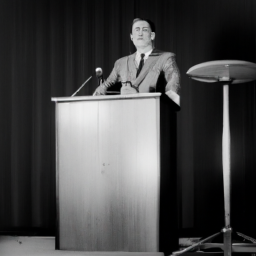In August 1974, President Richard Nixon resigned from office in disgrace following his involvement in the Watergate scandal. This left the country in a state of political crisis, with many Americans feeling disillusioned and distrustful of their government. The Vice President at the time, Gerald Ford, was sworn in as President, tasked with the daunting challenge of restoring faith in the White House.
Ford was not initially viewed as a strong leader, in part because he had not been elected to the presidency. However, he quickly set about trying to rebuild the public's trust in the government. One of his first acts as President was to pardon Nixon, a controversial decision that was widely criticized but that Ford believed was necessary to move the country forward.
Despite the criticism, Ford continued to push for transparency and accountability in government. He created the Privacy Protection Study Commission to investigate government surveillance of American citizens, and he signed the Privacy Act of 1974 to protect citizens' personal information.
Ford also focused on economic issues, working to combat inflation and promote job growth. He signed the Tax Reduction Act of 1975, which lowered taxes for middle-income Americans and small businesses. He also worked to reduce government spending and balance the budget.
In terms of foreign policy, Ford faced a number of challenges during his presidency. He inherited the Vietnam War, which he sought to end as quickly as possible. He also dealt with the aftermath of the Yom Kippur War in the Middle East, working to achieve a peace agreement between Israel and its Arab neighbors.
Despite the challenges, Ford was able to make significant progress during his time in office. He was known for his calm and steady leadership, and he was respected by both Democrats and Republicans for his willingness to work across party lines.
Ultimately, Ford's impact on American politics was significant. He helped to restore trust in the government after the Watergate scandal, and he worked to promote transparency and accountability in government. His economic policies helped to spur job growth and reduce inflation, and his foreign policy efforts helped to bring about peace in the Middle East.
In many ways, Ford's presidency was a turning point for the United States. It marked the end of a turbulent period in American history and the beginning of a new era of stability and progress. While Ford may not be remembered as one of the most dynamic presidents in history, his steady leadership and commitment to public service made him a respected and admired figure in American politics.
In conclusion, the presidency of Gerald Ford was a critical moment in American history. He took over the White House at a time of great turmoil and uncertainty, and he worked tirelessly to restore trust in the government and promote transparency and accountability. His policies helped to spur economic growth and reduce inflation, and his foreign policy efforts helped to bring about peace in the Middle East. Today, Ford is remembered as a steady and respected leader who helped to guide the country through a challenging period in its history.
